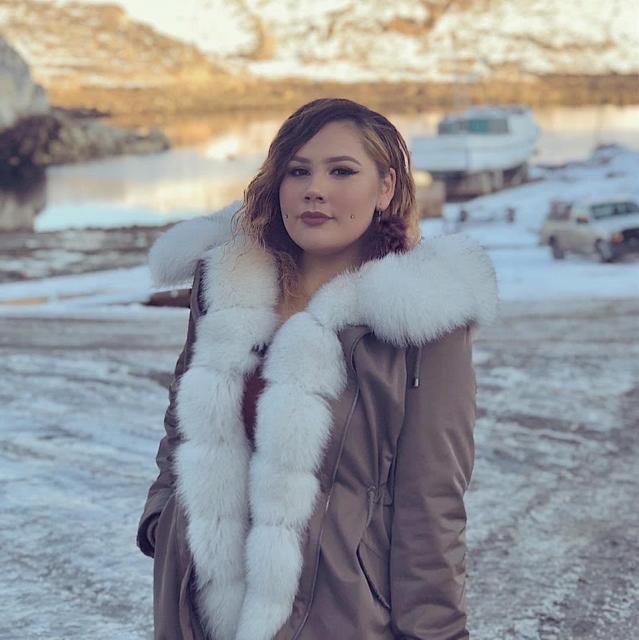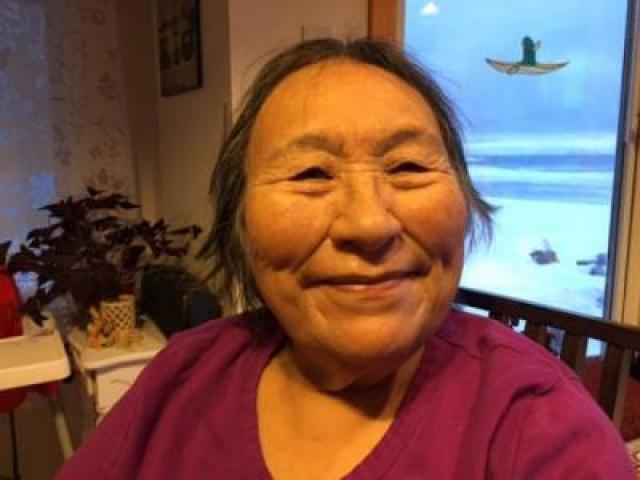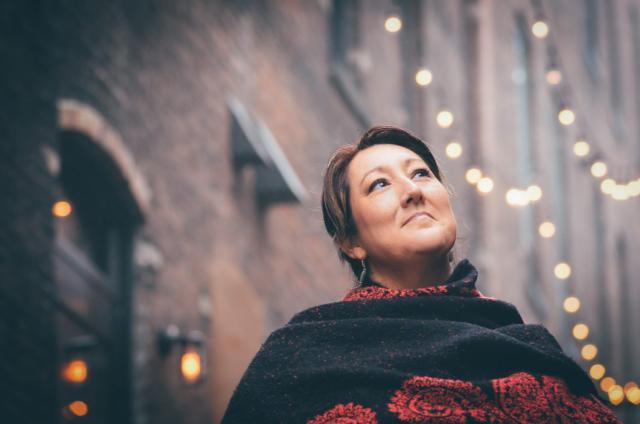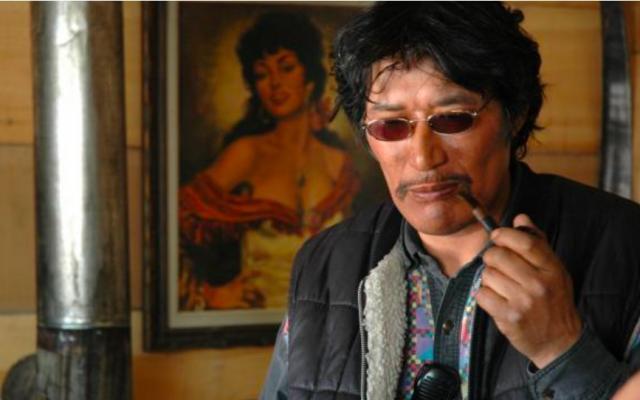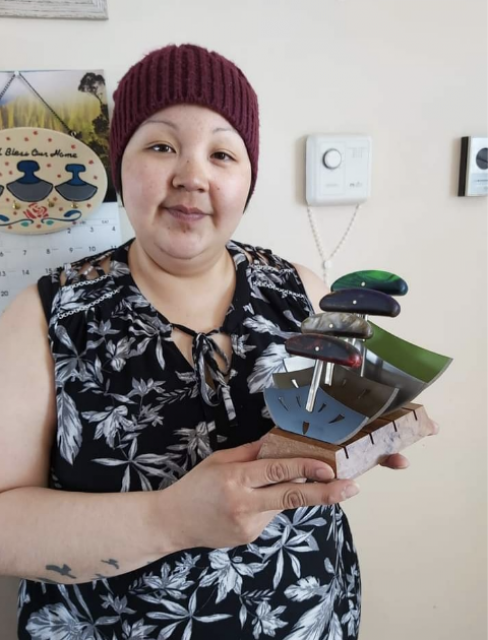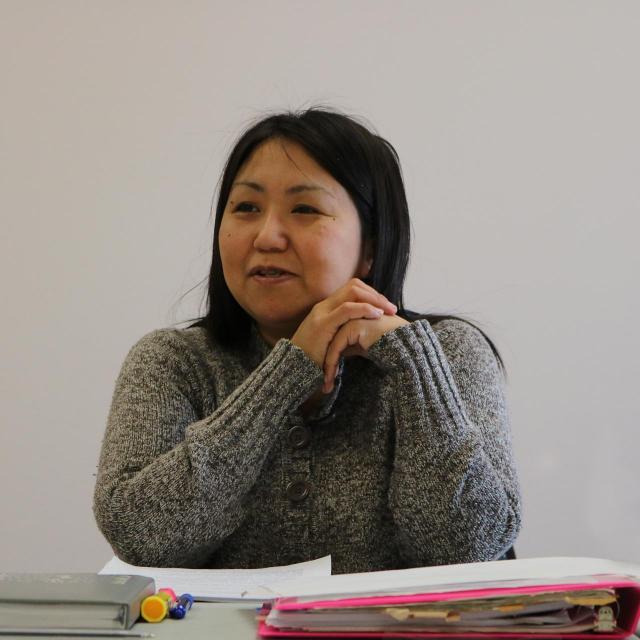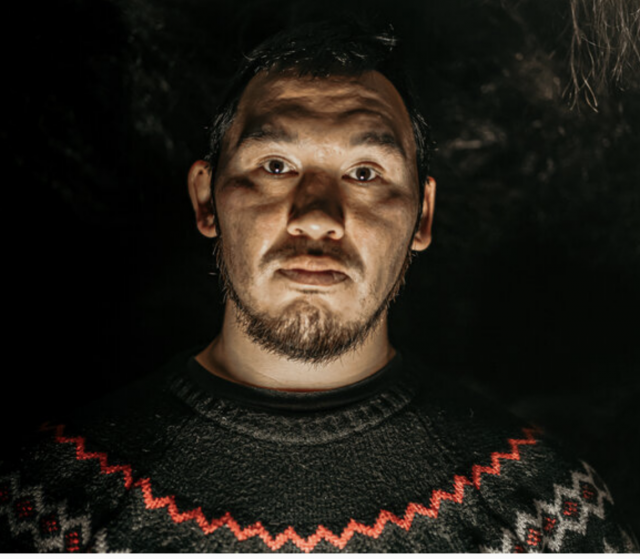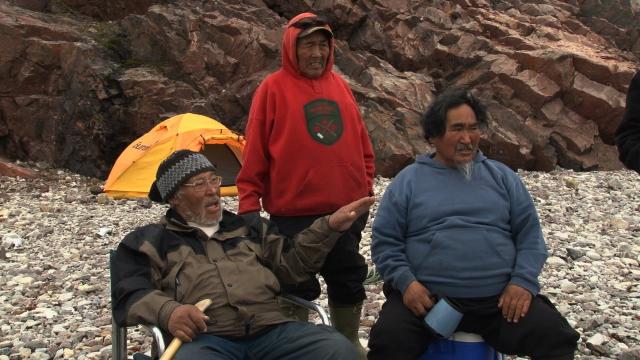Acerca de
Angela Amarualik was born and raised in Igloolik, Like many small communities in Canada’s Arctic, Igloolik had many social problems. Angela worked hard to retain good attitude, improve circumstances, and be a role model for the younger kids in her town. Already community role model - as well as Miss Igloolik - Angela now uses her music to inspire Nunavummiut youth and share Inuit culture with people around the world. Starting off with the ukulele, Angela began writing songs in her native language, Inuktitut. Her musical style is a mix between ancient Inuit melodies and throat-singing, and the pop music of her childhood heroes Beatrice Deer and Hilary Duff. Her music has taken her across Canada, and in 2018, Angela released her self-titled debut album. The album was nominated for 3 Indigenous Music Awards, including Best New Artist. And took home the Award for the Best Inuit, Indigenous Language, or Francophone Album.
Susan Avingaq has an artistic practice that inhabits the roles of actor in film and television, Director in film, and Costume Design for film and theatre. She has been an Inuit cultural consultant, Storyteller, a keeper of traditional Inuit songs, and a cultural teacher to children and youth in the community. She directed and produced the documentary Sol, and contributed to the following feature films: Maliglutit: Costume Design, Uvanga: Actor, Director, Producer, Journals of Knud Rasmussen: Costume Design, Atanarjuat: Costume Design.
Beatrice Deer, singer-songwriter, winner of the Canadian Aboriginal Music Awards and Canadian Folk Music Awards, is from Nunavik. Half Inuit and half Mohawk, Deer left the small Quebec town of Quaqtaq in 2007. She has five albums to her credit. It is a body of work in which she uniquely mixes traditional Inuit throat singing with contemporary indie rock. My All to You, her fifth album, marks an important milestone in the history of Inuindie music (a genre of which Deer is the pioneer) because, for the first time, she composed all the original music and lyrics. The topics covered include classic Inuit folk tales and legends, as well as personal development as an important tool in the search for understanding and the quest for meaning. She has attracted audiences worldwide and her songs are particularly loved in the Canadian Arctic, where the audience sings her songs during the many concerts she performs there. She sings in three languages: Inuktitut, English, and French. As a role model for her community and an activist for healthy lifestyles, Deer is often invited to speak. Her main message is that each of us must take control of our own lives. "No one else can do it for us. It is impossible to change what has happened. You can only adopt a new way of dealing with this past. "
Deantha Edmunds is Canada’s first and only Inuk professional classical singer and recording artist. She has performed on stages across the world. A proud resident of Newfoundland and Labrador, Edmunds is a laureate of the prestigious Hnatyshyn Foundation REVEAL Indigenous Art Awards.
Born in 1957 in a sod house on Baffin Island, Zacharias Kunuk was a whalebone carver in 1981 when he sold three sculptures in Montreal to buy a home video camera and 27” TV to bring back to Igloolik, a settlement of 500 Inuit who twice had voted to refuse outside television. Kunuk worked six years for Inuit Broadcasting Corporation as producer and station manager, and then co-founded Igloolik Isuma Productions Inc. in 1990 with Paul Apak, Pauloosie Qulitalik and Norman Cohn. Besides Atanarjuat The Fast Runner, Kunuk has directed more than 30 videos screened in film festivals, theatres, museums and art galleries throughout Canada and around the world. He has honorary doctorates from Trent University and Wilfried Laurier University; is winner of the Cannes Camera d’or, two Genie Awards, a National Arts Award, National Aboriginal Achievement Award and in 2005 was named an Officer of the Order of Canada. In 2019 Zacharias Kunuk together with the Isuma collective represented Canada, in the 58th Venice Biennale.
Katelyn-Joy Tiktaq is a inuk throat singer, Katelyn have performed in many different places. Katelyn started throat singing since Junior high school and slowly teaching her three daughters how to throat sing. Katelyn-Joy and her family are living in Arviat, Nunavut.
Lucy Tulugarjuk is an actor, creative performer, and the Executive Director of Nunavut Independent Television Network (NITV). Born in Churchill, MB, and raised in Igloolik and Sanirajak (Hall Beach), Nunavut, Lucy is well-known for her award-winning performances in feature films, including "Atanarjuat: The Fast Runner", which won the Camera D’Or and Genie Award for Best Picture in 2002. In 2001, she was awarded the Best Actress Award from the American Indian Film Institute, San Francisco. She is the co-writer and director of the 2018 feature film, "Tia and Piujuq", which premiered at the Carrousel Children’s Film Festival and the Boston Kid’s Film Festival in 2018. In addition to her work in film and television, Lucy is a skilled Inuktitut translator.
Terry Uyarak is a self-taught singer/songwriter and musician from Igloolik, a small and vibrant Inuit community located north of the Arctic circle between the Canadian mainland and Baffin Island in Nunavut. Igloolik is one of those special places in the Canadian Arctic, where Inuit language and culture are still strongly embedded into everyday life, and there’s a strong sense of community within. Terry is no stranger to the tight knit Nunavut music scene, for over a decade he performed as an actor, juggler and musician, and toured around the globe with the only Inuit circus troupe in the world, ARTCIRQ. Most recently, Terry co-directed and performed in a major multidisciplinary production, Unikkaaqtuaq, that toured across Canada in 2020. Terry’s debut album Nunarjua Isulinginniani (Before the World Ends) produced by Jace Lasek and titled carefully weaves together storytelling, soundscape and song to carry each listener on a journey, by dog team, to the ends of the word. Between Uyarak’s song writing, which is reflective of his experiences as a husband, father and hunter; and Igloolik elder Simon Qamaniq’s storytelling, you really begin to feel a sense of the environment in which they belong to.

